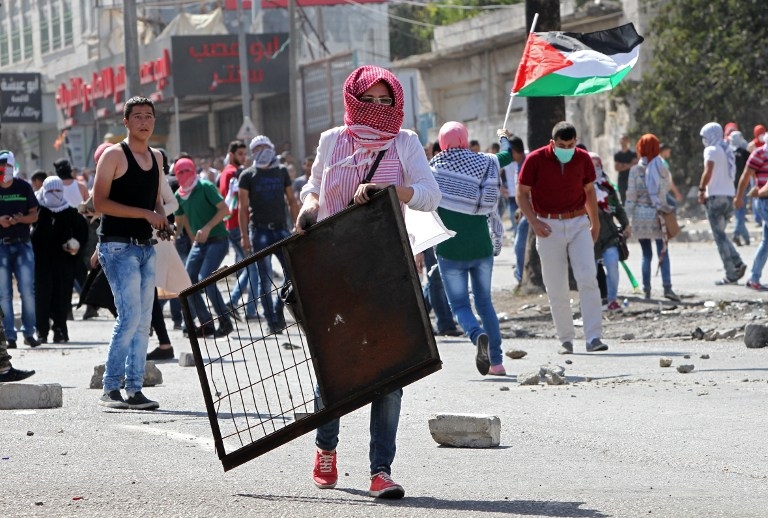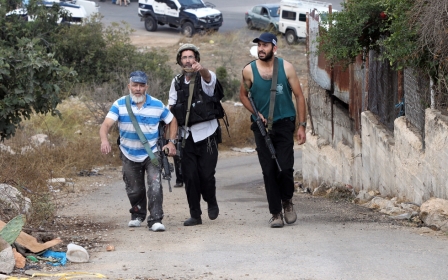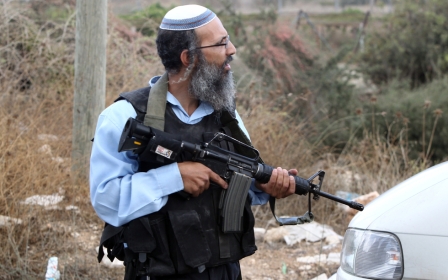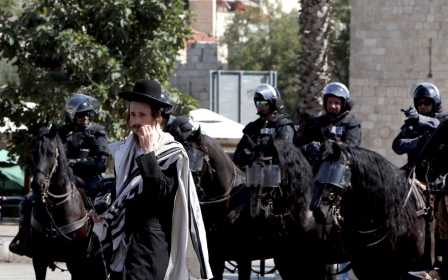Tensions rise overnight in East Jerusalem and West Bank

After four Palestinians were shot dead and a fifth was wounded in alleged attacks on Israelis in East Jerusalem and the West Bank, tensions through the night on Saturday have been on the rise in Israel and the Occupied Palestinian Territories.
More than 200 Israeli settlers attacked the Palestinian villages of Wad al-Haseen and Wad al-Nasara near the Israeli settlement of Kiryat Arba overnight in the eastern Hebron district of the West Bank, locals and medics told Maan News agency.
During the attack, Israeli settlers reportedly threw stones and firebombs at Palestinian homes and injured at least three people, two of whom were minors, while Israeli forces later shot and injured one Palestinian with live fire, reported Maan.
Kayed Daana, one of the residents whose home was attacked, told Maan that dozens of Israeli settlers attacked her neighborhood and injured at least three of her neighbours, identified as 40-year-old Imad and two minors, Abdullah, 13, and Muhammad, 17.
Palestinian villagers fled to their local mosques and used the mosque amplifier to call for help from neighboring Palestinian villages and communities, who responded to their calls.
Israeli forces then got involved, shooting tear gas at Palestinians who showed up to help, reported Maan.
The incidents overnight came after more than two weeks of relentless violence and unrest, raising fears of a full-scale Palestinian uprising.
Forty-one Palestinians have been killed since an upsurge in violence began on 1 October, while seven Israelis have lost their lives.
Violent protests have also erupted in annexed East Jerusalem, the occupied West Bank and the Gaza Strip.
Three of Saturday's shootings took place in the flashpoint West Bank city of Hebron, where some 500 Jewish settlers live in a heavily guarded enclave in the city centre.
Incident at holy site
Meanwhile, Israel pressed ahead with major security measures on Sunday as Ultra-Orthodox Jews illegally visiting a West Bank holy site set ablaze last week were assaulted by Palestinians.
Israel has set up checkpoints in Palestinian areas of East Jerusalem and hundreds of soldiers have reinforced their patrols.
The incident saw a group of about 30 religious students from a school in Jerusalem travel to Joseph's Tomb in the northern West Bank city of Nablus despite not having the required authorisation from Israel’s military.
They told police they intended to repaint the shrine after the fire.
According to Israeli authorities, Palestinian police beat at least some of them with their batons and the butts of their guns. A group of Palestinian civilians arrived afterward and also beat them, according to Israeli police.
They were not reported to have been seriously injured.
A Palestinian security source denied that police had beat them but said that dozens of civilians arrived later and burned one of the cars used by the Jewish students. Israeli police also said one of their cars had been burned.
Most of the students fled, but five were arrested by Palestinian police and later handed over to Israeli authorities, according to Israeli police. The Palestinian source reported three arrested.
Joseph's Tomb, inside a compound in the Palestinian refugee camp of Balata in Nablus, has been the scene of recurring violence between Israelis and Palestinians.
Many Jews believe it to be the final resting place of the biblical patriarch Joseph, while Muslims believe an Islamic cleric, Sheikh Yussef (Joseph) Dawiqat, was buried there two centuries ago.
The shrine is under Palestinian control and off-limits to Israelis except on escorted trips organised by the army.
International observers
The violence since the start of the month has drawn deep international concern.
The United States, which tried but failed last year to broker peace talks between Israel and the Palestinians, has urged leaders on both sides to help rein in the unrest.
"We are very concerned about the outbreak of violence," US President Barack Obama said in Washington Friday, calling on Israeli Prime Minister Benjamin Netanyahu and Palestinian President Mahmud Abbas "to try to tamp down rhetoric that may feed violence or anger or misunderstanding".
The violence began on 1 October, when a suspected cell of the Islamist movement Hamas murdered a Jewish settler couple in the West Bank in front of their children.
The attack followed repeated clashes in September between Israeli forces and Palestinian youths at East Jerusalem's flashpoint Al-Aqsa mosque compound.
Muslims fear Israel will seek to change rules governing the site, though Netanyahu has said repeatedly he has no intention of doing so.
Israel has rejected a proposal by France to have international observers sent to the compound, saying it "rewards the terrorism that the Palestinians initiated".
New MEE newsletter: Jerusalem Dispatch
Sign up to get the latest insights and analysis on Israel-Palestine, alongside Turkey Unpacked and other MEE newsletters
Middle East Eye delivers independent and unrivalled coverage and analysis of the Middle East, North Africa and beyond. To learn more about republishing this content and the associated fees, please fill out this form. More about MEE can be found here.




